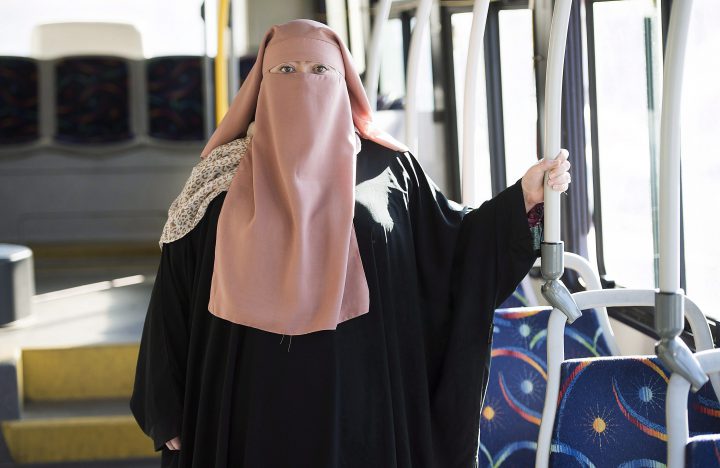There are so many third rails in Canadian politics — issues so explosive that parties will tie themselves in knots to avoid them, or else choose to punt them to the courts.

Same-sex rights, abortion and private health care top the list, to which — thanks to Quebec’s Bill 62 — we can now add niqabs and burkas. One can almost hear all three major federal parties quaking in their collective shoes as they approach the next election with this law hovering like a giant sword of Damocles over their heads.
Quebec’s Bill 62 bans the wearing of face coverings when dealing with the state, whether you are boarding public transit, visiting a medical clinic, or getting your driver’s licence. By using the language of security, identification and communication, the bill throws all face coverings — whether ski masks, niqabs, or sunglasses — into one box.
As alibis go, it’s pretty thin. People have been boarding buses in Montreal in -40 C weather with their faces wrapped in scarves for decades. Nobody ever considered it a security issue before, for an excellent reason: It wasn’t one and isn’t one now.
Bill 62 isn’t about security or the sanctity of the “secular state.” It came about because some Muslim women cover their faces for religious reasons — even though there’s nothing in the Koran that mandates that women cover their faces to show devotion to their faith. This is what inspired Bill 62, and this is what the debate should be about — whether our politicians want it to be or not.
Religion can mandate many practices, and every society chooses which ones it embraces, tolerates, or opposes, based on its beliefs, laws and customs — and in Canada’s case, the fundamental rights guaranteed in the Charter. Those rights include freedom of expression, equality and freedom of religion.
These rights have clashed innumerable times in court, in cases involving the banning of teachers from classrooms due to their sexual orientation (Vriend v. Alberta), the signing of codes of conduct by students which ban same-sex relationships (Trinity Western University vs. the Law Society of Upper Canada (and British Columbia) and polygamy (Bountiful vs. B.C.).
In two of these three cases (Trinity Western is to be heard this fall by the Supreme Court), equality rights took precedence over religious freedoms, regardless of what practices the people and institutions involved believed to be important to their faith. Some of Winston Blackmore’s daughters supported his polygamist marriages; that did not matter to the courts.
“I have concluded that this case is essentially about harm,” wrote Chief Justice Robert Baumann of the B.C. Supreme Court. “More specifically, Parliament’s reasoned apprehension of harm arising out of the practice of polygamy. This includes harm to women, to children, to society and to the institution of monogamous marriage.”
- ‘Shock and disbelief’ after Manitoba school trustee’s Indigenous comments
- ‘Super lice’ are becoming more resistant to chemical shampoos. What to use instead
- Is home ownership only for the rich now? 80% say yes in new poll
- Invasive strep: ‘Don’t wait’ to seek care, N.S. woman warns on long road to recovery
COMMENTARY: Nobody is surprised Quebec is going after the niqab yet again
If courts find the institution of monogamous marriage important to uphold, then what of the principle of gender equality? Instead of tying itself into knots over security on buses, the Quebec government could have argued that the niqab and burka — whether worn voluntarily or not — undermine that principle.
They are not simply face coverings. They are articles of clothing required by repressive movements such as the Taliban, in places where women have no fundamental rights whatsoever — to education, work, or even unescorted movement outside of their own homes. Their removal in places like Saudi Arabia has become an act of defiance that has led to women being arrested, beaten and imprisoned. They have become symbols of oppression, and are banned or restricted in countries as diverse as France, Eqypt, Switzerland, Chad, the Netherlands, Spain, Belgium and, soon, Denmark.
In Canada, most commentators have argued that banning the burka or niqab violates human rights, women’s rights, and particularly the rights of Muslim women. Initially, Prime Minister Justin Trudeau seemed to agree. “I don’t think it’s the government’s business to tell a woman what she should or shouldn’t be wearing … As a federal government, we are going to take our responsibility seriously and look carefully at what the implications are.”
Since then — and particularly since the Liberals won a byelection in the Quebec riding of Lac St Jean — he and other Liberals seem to be tamping down their criticisms, preferring to leave the issue to the courts and avoid the spectacle of Ottawa going to war with Quebec City — catnip for sovereigntists.
Sorry, but you can’t be a self-proclaimed feminist and skirt this issue. While some women may wear the niqab or burka as a personal choice, an expression of religious belief, others are coerced into wearing it. And while supporters of these garments claim that the government can’t tell you what to wear, they ignore the fact that it does so, every day. (Try going to work naked and see what happens.)
As for the political fallout for supporting a ban or burkas and niqabs, it might not turn out to be what our politicians think. In an interview with AM640, Ipsos CEO Darryl Bricker refuted the idea that doubling down on opposition to wearing a niqab at citizenship ceremonies was the reason why the Conservatives lost the 2015 federal election:
Governments need to have an honest debate about what Bill 62 is really about. Banning the burka or niqab can be justified if the wearing of these garments compromises the principle of male-female equality. There are valid arguments that they normalize the notion that a pious woman, a good woman, should be covered — not exactly the kind of thing feminists had in mind when they started fighting for gender equality over a century ago.
This is the true debate at the heart of Bill 62. But unless our leaders — starting with the prime minister — start the conversation, it is not the one we will have.
Tasha Kheiriddin can be heard between noon and 2 p.m. ET on Toronto Talk Radio AM640. She’s also a columnist with Global News and iPolitics.ca, where this piece first appeared.









Comments